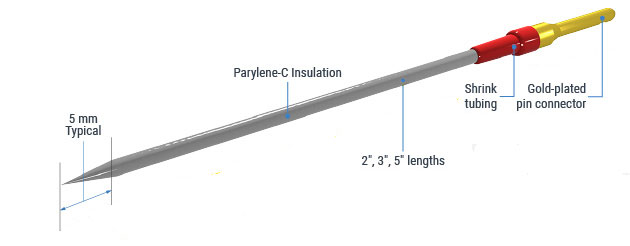
Platinum-Iridium Electrodes, Blunted Tip
Platinum-Iridium alloy is considered by many to be the “gold standard” for chronic recording and microstimulation due to its excellent electrochemical and mechanical characteristics.
| Advantages | Disadvantages |
|
|
These monopolar microelectrodes of MicroProbes are also available in Tungsten, Elgiloy (an alloy similar to stainless steel), and Pure Iridium metal. The electrodes are insulated with a thin film of vapor-deposited Parylene-C. As an option we provide them surrounded by Polymide tubing. Each electrode is etched to a fine taper and tipped using a proprietary process to a specific impedance value. Four different tip profiles are also available to further fine-tune your electrode selection to your particular application.
We offer a variety of different tip alternatives for those that prefer a specialized electrode profile for their research.
The tip selection can provide subtle yet important changes to the performance of the electrode, as described below. It is recommended that first time users consider experimenting with different tip profiles to determine which works best for their recording or stimulation protocols.
For some applications concentric or bipolar electrodes (stereotrodes) are useful.
Monopolar Electrodes, Platinum-Iridium, Blunted Tip
(75 µm × 2")
|
Item |
Length |
Shaft Diameter |
Tip Diameter |
Impedance |
Applications |
Pkg of 10 |
|
PI20030.01B3 |
51 mm |
0.081 mm |
3-5 µm |
0.01 MΩ |
MultiUnit & ERP recording & Stim |
|
|
PI20030.05B3 |
51 mm |
0.081 mm |
0.05 MΩ |
|||
|
PI20030.1B3 |
51 mm |
0.081 mm |
0.1 MΩ |
|||
|
PI20030.5B3 |
51 mm |
0.081 mm |
0.5 MΩ |
Single & multiunit rec. & stim. |
||
|
PI20031.0B3 |
51 mm |
0.081 mm |
3-4 µm |
1.0 MΩ |
||
|
PI20031.5B3 |
51 mm |
0.081 mm |
1.5 MΩ |
|||
|
PI20032.0B3 |
51 mm |
0.081 mm |
2.0 MΩ |
|||
|
PI20032.5B3 |
51 mm |
0.081 mm |
2.5 MΩ |
Greater Selectivity - Small Cells |
||
|
PI20033.0B3 |
51 mm |
0.081 mm |
3.0 MΩ |
|||
|
PI20035.0B3 |
51 mm |
0.081 mm |
5.0 MΩ |
Monopolar Electrodes, Platinum-Iridium, Blunted Tip
(125 µm × 2")
|
Item |
Length |
Shaft Diameter |
Tip Diameter |
Impedance |
Applications |
Pkg of 10 |
|
PI20030.01B5 |
51 mm |
0.127 mm |
3-5 µm |
0.01 MΩ |
MultiUnit & ERP recording & Stim |
|
|
PI20030.05B5 |
51 mm |
0.127 mm |
0.05 MΩ |
|||
|
PI20030.1B5 |
51 mm |
0.127 mm |
0.1 MΩ |
|||
|
PI20030.5B5 |
51 mm |
0.127 mm |
0.5 MΩ |
Single & multiunit rec. & stim. |
||
|
PI20031.0B5 |
51 mm |
0.127 mm |
3-4 µm |
1.0 MΩ |
||
|
PI20031.5B5 |
51 mm |
0.127 mm |
1.5 MΩ |
|||
|
PI20032.0B5 |
51 mm |
0.127 mm |
2.0 MΩ |
|||
|
PI20032.5B5 |
51 mm |
0.127 mm |
2.5 MΩ |
Greater Selectivity - Small Cells |
||
|
PI20033.0B5 |
51 mm |
0.127 mm |
3.0 MΩ |
|||
|
PI20035.0B5 |
51 mm |
0.127 mm |
5.0 MΩ |
Monopolar Electrodes, Platinum-Iridium, Blunted Tip
(125 µm × 3")
|
Item |
Length |
Shaft Diameter |
Tip Diameter |
Impedance |
Applications |
Pkg of 10 |
|
PI30030.01B5 |
76 mm |
0.127 mm |
3-5 µm |
0.01 MΩ |
MultiUnit & ERP recording & Stim |
|
|
PI30030.05B5 |
76 mm |
0.127 mm |
0.05 MΩ |
|||
|
PI30030.1B5 |
76 mm |
0.127 mm |
0.1 MΩ |
|||
|
PI30030.5B5 |
76 mm |
0.127 mm |
0.5 MΩ |
Single & multiunit rec. & stim. |
||
|
PI30031.0B5 |
76 mm |
0.127 mm |
3-4 µm |
1.0 MΩ |
||
|
PI30031.5B5 |
76 mm |
0.127 mm |
1.5 MΩ |
|||
|
PI30032.0B5 |
76 mm |
0.127 mm |
2.0 MΩ |
|||
|
PI30032.5B5 |
76 mm |
0.127 mm |
2.5 MΩ |
Greater Selectivity - Small Cells |
||
|
PI30033.0B5 |
76 mm |
0.127 mm |
3.0 MΩ |
Monopolar Electrodes, Platinum-Iridium, Blunted Tip
(225 µm × 2")
|
Item |
Length |
Shaft Diameter |
Tip Diameter |
Impedance |
Applications |
Pkg of 10 |
|
PI20030.01B10 |
51 mm |
0.231 mm |
3-5 µm |
0.01 MΩ |
MultiUnit & ERP recording & Stim |
|
|
PI20030.05B10 |
51 mm |
0.231 mm |
0.05 MΩ |
|||
|
PI20030.1B10 |
51 mm |
0.231 mm |
0.1 MΩ |
|||
|
PI20030.5B10 |
51 mm |
0.231 mm |
0.5 MΩ |
Single & multiunit rec. & stim. |
||
|
PI20031.0B10 |
51 mm |
0.231 mm |
3-4 µm |
1.0 MΩ |
||
|
PI20031.5B10 |
51 mm |
0.231 mm |
1.5 MΩ |
|||
|
PI20032.0B10 |
51 mm |
0.231 mm |
2.0 MΩ |
|||
|
PI20032.5B10 |
51 mm |
0.231 mm |
2.5 MΩ |
Greater Selectivity - Small Cells |
||
|
PI20033.0B10 |
51 mm |
0.231 mm |
3.0 MΩ |
Common Tip Profiles:
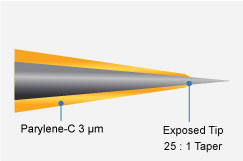
The standard tip profile features a sharp yet robust point that offers versatile performance and an effective balance between penetration and durability.
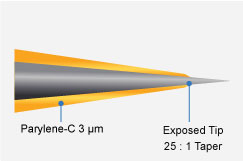
The blunted electrodes are engineered to have a more rounded, bullet-shaped tip. For many applications the blunted tip can offer superior stimulation performance.
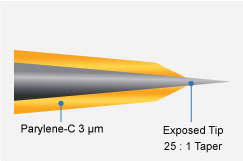
The heat-treated electrodes are intended for those investigators who must penetrate their probes through tough membranes, such as the dura mater of larger mammals.
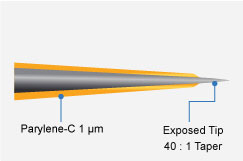
The extra-fine tip profile features a significantly sharper taper as well as a thinner insulation layer. Available in Tungsten only!
Also see:
Selecting the Optimum Electrode Configuration
